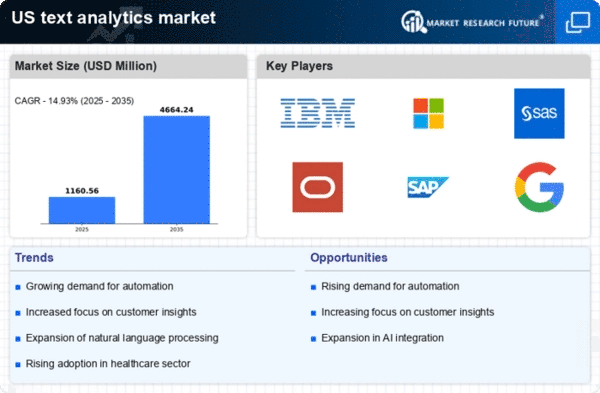Emergence of Multilingual Analytics
The emergence of multilingual analytics is reshaping the text analytics market, as businesses expand their operations globally. Organizations are increasingly recognizing the importance of analyzing text data in multiple languages to cater to diverse customer bases. This trend is supported by data indicating that 40% of US companies are investing in multilingual text analytics solutions to enhance their global reach. As the demand for language diversity in analytics grows, the text analytics market is expected to evolve, with a projected growth rate of 20% over the next few years. This development underscores the necessity for businesses to adapt their analytics strategies to accommodate linguistic variations.
Growing Demand for Customer Insights
The text analytics market is experiencing a notable surge in demand for customer insights, driven by businesses seeking to enhance their understanding of consumer behavior. Companies are increasingly leveraging text analytics tools to analyze customer feedback, social media interactions, and online reviews. This trend is underscored by a report indicating that 70% of organizations in the US prioritize customer experience, leading to a projected growth rate of 25% in the text analytics market by 2026. As organizations strive to tailor their offerings to meet customer expectations, the text analytics market is positioned to play a crucial role in providing actionable insights that inform strategic decision-making.
Rising Adoption of Cloud-Based Solutions
The rising adoption of cloud-based solutions is transforming the text analytics market landscape. Organizations are increasingly migrating their analytics operations to the cloud, driven by the need for scalability, flexibility, and cost-effectiveness. Cloud-based text analytics platforms offer enhanced collaboration and accessibility, allowing teams to analyze data from anywhere. This shift is evidenced by a report indicating that 55% of US enterprises have adopted cloud-based analytics solutions. As cloud technology continues to evolve, the text analytics market is likely to experience accelerated growth, with an anticipated market size of $4 billion by 2026. This trend suggests a paradigm shift in how organizations approach data analysis.
Advancements in Natural Language Processing
Advancements in Natural Language Processing (NLP) technologies are significantly influencing the text analytics market. The integration of sophisticated algorithms enables organizations to extract meaningful information from unstructured data sources, such as emails, chat logs, and documents. As NLP capabilities improve, the accuracy and efficiency of text analytics solutions are expected to enhance, potentially increasing market adoption rates. The text analytics market is projected to reach a valuation of $5 billion by 2027, reflecting the growing reliance on NLP-driven insights for competitive advantage. This evolution suggests that businesses are likely to invest heavily in text analytics tools to harness the power of language data.
Increased Focus on Competitive Intelligence
The text analytics market is witnessing an increased focus on competitive intelligence as organizations strive to gain an edge in their respective industries. By analyzing competitors' communications, marketing strategies, and customer sentiments, businesses can identify trends and opportunities for differentiation. This strategic approach is reflected in a survey indicating that 60% of US companies utilize text analytics for competitive analysis. As the need for real-time insights intensifies, the text analytics market is expected to expand, with a projected CAGR of 22% over the next five years. This growth highlights the critical role of text analytics in shaping business strategies.
















